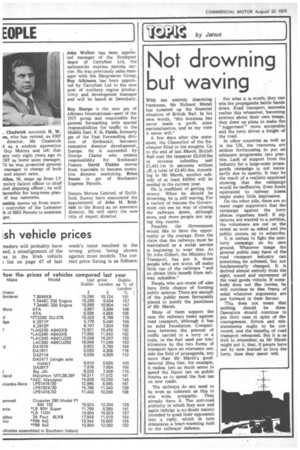Not drowning but waving
Page 22

If you've noticed an error in this article please click here to report it so we can fix it.
With not entirely disarming frankness, Mr Richard Marsh has summed up the finantial situation ;of British Rail. In 'his own words, 'this business has never made a profit since nationalisation, and in my view it never will."
A few days after this statement, the Chancellor of the Exchequer filled in the noughts. Up to the end of last March, British Rail cost the taxpayer £2,010.5m in revenue subsidies ;and E1,451.1rn in amounts written off, a total of £3,461.6m. According to Mr Marsh, another subsidy of at least £430m will be needed in the current year.
He is confident of getting the money. When he should be drowning, he is still waving. For a variety of reasons the Government can see no way of closing the railways down, although more and more people are urging this course.
Possibly the Government would like to have the opportunity or the courage. Even the claim that the railways must be maintained as a social service is beginning to wear thin. As Dr John Gilbert, the Minister for Transport, has put it, those people who are worst off make little use of the railways "and so obtain little benefit from railway subsidies."
People who are worst off also have little chance of forming public opinion. There are enough of the public more favourably placed to justify the jauntiness of Mr Marsh.
Many of them support the case the railways make against road transport, although it has no solid foundation. Comparisons between the amount of traffic carried in a lorry or a train, or the fuel used per ton/ kilometre by the two forms of transport ;have no relevance outside the field of propaganda, any more than Mr Marsh's goodnatured jibes that, for example, it makes just as much sense to spend the liquor tax on public 'houses as to spend the fuel tax on new roads.
The railways do not need to be even as coherent as this to WIRI wide sympathy. They already have it. The anti-road publicity in ;which they now and again ;indulge is no doubt mainly intended to goad their opponents into a reply, which in turn stimulates a heart-warming rush to the 'railway's' defence. For what it is worth, they can win the propaganda battle hands down. Road transport interests realise this whenever, becoming anxious about their own image, they draw up plans to make the " juggernaut " more acceptable and the lorry driver a knight of the road.
In other countries as well as in the UK, the resources are seldom forthcoming to put an adequate programme into practice. Lack of support from the industry for a large-scale propaganda campaign is not necessarily due to apathy. It may be the result of a realistic appraisal showing that the 'campaign would be ineffective. Even funds equivalent to railway losses ;might make little impression.
On the other side, there are so many eager supporters that the campaign against the lorry ahnost organises itself. If signatures are wanted to a petition, the volunteers are out on the street as soon as asked and the public queues up to subscribe.
It is useless to fight the antilorry campaign on its own ground. Whatever image the general public may have of the road transport industry can sometimes be softened, but not fundamentally changed. It is derived almost entirely from the sight, sound and ;movement of the road goods vehicle. If somebody does not like lorries, ;he will continue in that frame of mind whatever arguments are put forward in their favour.
This does not mean that nothing should be done. Operators should continue to ;put -their case in spite of discouragement. Errors and Misstatements ought to be corrected, and the ibenefits of road transport rehearsed. But, it is as well to remember, as Mr Marsh might put it, that, if people have not by now learned to love the lorry, then they never Will.












































































